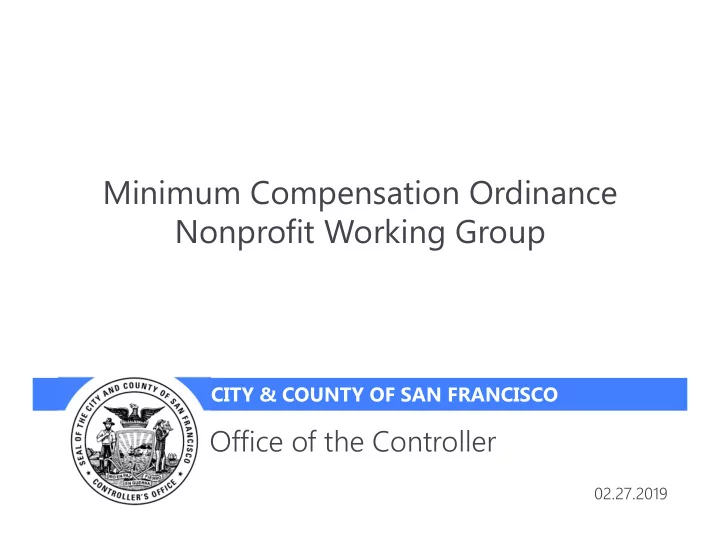

Minimum Compensation Ordinance Nonprofit Working Group CITY & COUNTY OF SAN FRANCISCO Office of the Controller 02.27.2019
2 Today’s Agenda - 1) Discussion of indirect cost pressures facing non-profit organizations: - Vertical (Wage compaction for employees at more than $16.50/hr) - Horizontal (Wage pressure for non-City contract employees) 2) Discussion of goals and open issues for final March meeting & final report
3 The Minimum Wage Increase and Wage Compaction at CBOs Two-thirds of survey respondents reported that the increase in the • minimum wage from $14.00 to $15.00 per hour did not lead to wage compaction increases for employees earning more than $15.00 per hour. Note that a few survey respondents did not have any employees earning • less than $15.00 per hour. Did CBOs Experience Wage Compaction Due to the Minimum Wage Increase? % Total Response # CBOs CBOs Reported Compaction 12 29% Did Not Report Compaction 28 67% No Answer 2 5%
4 Vertical Wage Compression: An Alternate Methodology Previous costing estimates assumed the incremental increase in the MCO • would be passed on to all employees earning up to some threshold wage. A second possible costing methodology is to gradually taper the amount • of the MCO that would be passed on to employees. For this alternative, we have assumed the vertical cost impact ends at $30 • per hour. We note this amount is twice what the state minimum wage will be • when it finishes its phase-in process. It is also a little higher than 50% Area Median Income for a family of four, a common eligibility level for HUD income-based programs. These could be used to benchmark the endpoint for vertical costs in future years.
5 Vertical Wage Compaction Alternate
6 Original vs. Alternate Methodologies 100% of Vertical Compaction Included Declining Vertical Compaction Costs Up to $30 per Hour Up to $30 per Hour ($millions) ($millions) $ 11.4 $ 7.2
7 Working Group Thoughts: Vertical Wage Compression Which of these methodologies most closely approximates how non-profit • employers are likely to respond to the MCO increase? Are there amendments or alternatives you would recommend? •
8 Horizontal Wage Equity: An Alternative Methodology Previous costing estimates assumed the increase in the MCO would be fully • passed through (including vertical compaction) to non-City contracts. A second possibility is to assume that the MCO cost increase to non-City • contracts is equal to the non-profits’ non-City share of labor costs. For example, if a non-profit’s • labor costs are 80% from City contracts and 20% from non- City contracts, this costing methodology would include 80% of the labor costs on non-City contracts.
9 Original vs. Alternate Methodologies Cost of $1 MCO Increase on NON-City Funded Contracts Includes Prorated Horizontal Equity Costs Based on Share of FTEs that Are City Funded 100% of Vertical Compaction Included Declining Vertical Compaction Costs Up to $30 per Hour Up to $30 per Hour ($millions) ($millions) $ 11.3 $ 1.9
10 Working Group Thoughts: Horizontal Wage Equity Which of these methodologies most closely approximates how non-profit • employers are likely to respond to the MCO increase? Are there amendments or alternatives you would recommend? •
11 Open Issues for March Meeting: How to acknowledge other cost pressures? We received feedback that the cost pressures created by the MCO are one portion of larger inflationary challenges facing non-profit organizations and workers. Our analysis of this issue hasn’t included the latter – the cost of doing business in an increasingly expensive region. Should we acknowledge this in our final report to the Mayor and Board? If so, how? How should City funds be allocated across providers? We’ve worked to estimate the total impact of the MCO on the non-profit community, but will need to determine a process to allocate funds to individual organizations. Administratively, how do we acknowledge different needs between organizations while avoiding burdensome award processes? Other key issues to consider for our final report?
12 Final Meeting March 27 4:00 – 5:30 pm City Hall Room 305
13 Additional Information
14 Follow-Up from Prior Meeting: Were Survey Respondents from All City Service Areas? Value of City Contracts by Major Service Areas
Recommend
More recommend